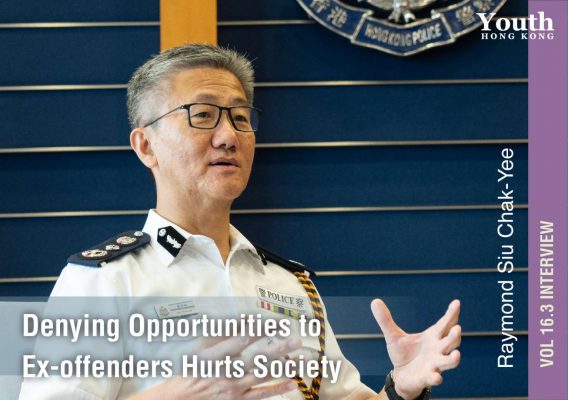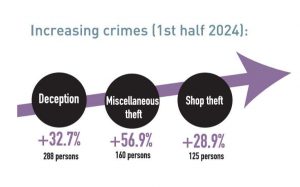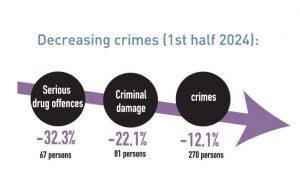Police Commissioner: Denying Opportunities to Ex-offenders Hurts Society
//16.3 Interview 1: Raymond Siu
Denying Opportunities to Ex-offenders
Hurts Society
Commissioner of Police, Raymond Siu Chak-Yee, shares his approach to crime prevention and stresses the importance of offering young ex-offenders a second chance.
Crimes like fraud, theft, and sex offences often dominate local news headlines. While the public might read them out of curiosity and nothing more, for the Hong Kong police, each case and each perpetrator is treated individually, especially in relation to juvenile offenders. This is a step forward of the police’s role as law enforcers, as well as crime prevention educators.
Commissioner Siu, during an exclusive interview with Youth Hong Kong, highlighted the third edition of the Youth Crime Prevention Booklet – released by the Hong Kong Police Force earlier this month and distributed to schools and libraries across Hong Kong – as evidence of the police’s proactive approach. The Booklet, which includes updated juvenile crime case studies and outlines common crime methods, offers guidance on recognising early signs of misconduct.
For the Commissioner, this prevention strategy is also part of his inherent work philosophy of: “working early, consistently, and co-operatively.” Even when young people veer off track, Siu stressed that society must offer them a “second chance,” adding that failure to do so would be “a loss for the whole community.”

Commissioner of Police Raymond Siu Chak-Yee, in an exclusive interview with Youth Hong Kong, stresses the importance of offering young ex-offenders a second chance.
Evolving Trends in Youth Crime
Police statistics reveal that in the first half of 2024, 1,541 young people aged 10 to 20 were arrested for criminal offences – a slight increase from last year but still 5.8% lower than the average of the past decade.
That said, the overall stability in youth crime numbers masks notable shifts in offence types. For instance, there has been a surge in fraud-related cases and a decline in serious drug offences, criminal damage, and triad-related crimes.
The police have observed an increase in young people being lured into fraud via social media, with alluring promises of quick money by renting or selling their bank accounts for use by criminal syndicates.
In contrast, Commissioner Siu highlighted that drug offences among young people have been steadily declining, dropping from 624 in 2021 to 297 in 2023, a decrease of 52.4%. Among these, the number of arrests for “serious drug offences” fell even more sharply, with a cumulative decrease of 58.6% from 2021 to 2023. The Commissioner attributes this reduction to the concerted efforts of the police, schools, parents, and NGOs in delivering anti-drug education.
“The data in 2023 saw a significant decline, primarily among the student population. We believe these numbers show that the efforts made in recent years have been effective, but we cannot afford to be complacent,” said the Commissioner.
Between 2021 and 2023, the police also recorded a recidivism rate of 15.9% among 1,844 juvenile offenders handled under the Police Superintendent’s Discretion Scheme.
Proactive Pillars of Crime Prevention
In response to the ever-evolving crime scene in Hong Kong, Commissioner Siu emphasised the shift of the police’s enhanced role from punishment to crime prevention, focusing on partnerships with government agencies, NGOs, parents, and schools.
“Relying on the police in crime prevention is not enough,” he said. The three pillars of starting the work early, consistently and co-operatively, enable the development of a coherent, practical and viable process in raising law-abiding young people.
“If you steal a needle when you’re young, you’ll steal gold when you’re older.”
Working early, Commissioner Siu explained, means building a solid foundation and instilling an early awareness to be law-abiding citizens. This can be delivered, for example, through civic and moral lessons at schools, starting from the primary school stage or even earlier at the kindergarten level. Children learning right from wrong at the earliest stages of cognitive development is something no one would argue against.
“If the awareness of crime prevention were ingrained at an early age, relative risks could be reduced. We often say, ‘If you steal a needle when you’re young, you’ll steal gold when you’re older,’ so the foundation is critical,” Commissioner Siu said.
He recalled his own teenage years when his father always taught him to be righteous and law-abiding. “My father taught me from a young age not to do anything bad. At the time, like most people, I found my parents’ teachings annoying. Now, I realise that these fundamental teachings have had a continuous influence on my growth.”
It is also crucial that the lessons learnt when very young are constantly reinforced. Working consistently, said the Commissioner, is especially necessary due to the changing crime landscape.
Finally, the third pillar of “working co-operatively” has a relevance that cannot be understated. Commissioner Siu has seen a growing trend of different sectors working together to protect young people from committing crimes. “Back in the 1990s, every sector, from schools, social workers to the police, were only minding their own business. They worked in isolation from one another and therefore, a major problem arose because everyone, despite their expertise, had their own blind spots.”

The commissioner joins mentees of the Leadership Institute on Narcotics in a training activity held on 5 March 2023.
Working Hand in Hand
For example, as a law enforcement department, the police understand the law, different types of criminals and the way they operate, while knowing little about education. But with the help from educators and social workers, there will be a 1+1>2 effect. “We have the same goal for the wellbeing of young people so why don’t we work together?”
With the police keeping parents and teachers in the loop of the latest crime situation, they were able to offer practical suggestions for addressing youth crime and different prevention methods. In fact, for the last four years, the collaboration between the police, principals’ associations, parents’ groups, and educational bodies, have resulted in a sharing of insights which eventually culminated in the creation of the Youth Crime Prevention Booklet. In publishing this handbook, which includes videos, teachers, parents, and educators have identified a common ground where they can engage with young people and steer them away from lives as potential criminals.
“We didn’t come up with the idea by ourselves but from rounds of meetings held with different sectors,” the Commissioner said, adding that simply spending several minutes going through this booklet may save students’ lives, especially concerning serious crimes.
For the Greater Good
When young people do step on the road of crime, punishments are essential as a deterrent, but giving them a chance to start over is equally important. Commissioner Siu talked about the Police Superintendent’s Discretion Scheme, a cautioning procedure that helps young offenders reform without being branded as criminals.
Commissioner Siu reiterated the importance of the Scheme since it considers the complex contributing factors to youth crime and the need to give chances to first-time offenders. “If we do not give them opportunities, young people will ultimately give up on themselves, which is not beneficial to society.”
“I hope society can give them a chance, provide them with hope, and help them feel that they have not been abandoned.”
As a follow-up to the Scheme, the police also handle cases by deploying its Youth Protection Unit for home visits and transferring cases to NGOs, the Education Bureau and the Social Welfare Department. This gives at-risk youth a chance for a fresh start, and helps them regain their footing and reintegrate into society.
“Many people still view the police as mere law enforcers, believing their role is arresting criminals, resolving conflicts, and punishing them,” Commissioner Siu said. “However, we do more than that. We also provide support and guidance to help young offenders get back on track, ensuring they don’t give up on themselves just because they made a mistake.”
Over the past few years, Commissioner Siu has been committed to protecting young people in Hong Kong by being an active participant in the Federation’s Turning Point Improvement Award, an award to recognise young people who have turned their lives around to become law-abiding citizens. He acknowledged he has been inspired by the stories of many young individuals and how they overcame the odds to turn their lives around.
“What touches me the most is seeing these young people. Just looking at them from the outside, I wouldn’t consider them bad individuals. In fact, they possess many talents; some excel in sports, while others are very intelligent.” The issue, he added, lies in whether there are platforms available for them to showcase their abilities and talents. This will give them a sense of accomplishment and, therefore, help them find their purpose in life.
“I hope society can give them a chance, provide them with hope, and help them feel that they have not been abandoned. They still have an opportunity to turn over a new leaf and regain their footing,” Commissioner Siu said. “If society does not offer them opportunities, they may ultimately be exploited and, during their most vulnerable moments, turn back to illegal activities, which would be a loss for the whole community.”
Reflecting on his 36 years serving in the Hong Kong Police Force, Commissioner Siu, who will retire next year, concluded the interview by sharing his life motto with young people – “Success in work comes from hard work, and a fulfilling life is achieved through perseverance.” He believes young people are the future, and each person has something to contribute to society. “When facing setbacks in life, we need to remind ourselves that this is just one chapter, which will help us learn and grow.”
How does the Commissioner see the future? Hong Kong never gives up on young people, especially those who have stumbled. “Young people are our future, and we all win the battle when they succeed.” ■




